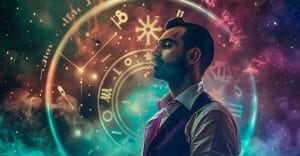Astrology, a mystical science once relegated to its dusty books and occult clubs, is having a new-age renaissance. With the information era and artificial intelligence, the ancient knowledge of the stars is now being merged with new technology to usher in a new paradigm of astrological consciousness. From AI-computed birth charts to personalized daily horoscopes on smartphones, astrology is being re-machined for the modern age.
Here in this article by Kirill Yurovskiy, we learn how astrology is evolving in London and globally, and where technology meets tradition. We learn about the use of AI in astrological analysis, the ethics of predictive astrology, and how new practitioners are bringing cosmic awareness into self-care and community. Finally, we look to the future of data-driven astrology and its increasing trend in wellness and lifestyle markets.
1) The New Astrological Renaissance in London
London, that venerable melting pot of old and new, has itself become a hotspot for the astrological renaissance. From column inches in the press and specialist bookshops, astrology has leaked as a popular cultural phenomenon. Pop-up astro cafes, waitlist workshops, and social media astrologers with massive followings all speak to a new public fascination with the stars.
The Millennial and Gen Z generations are employing astrology, not just as entertainment, but as a self-help tool and an indicator of emotional intelligence. The Pattern and Co-Star apps have just taken the know-how of astrology and made it accessible to users in their day-to-day lives on a regular basis, using bite-sized suggestions from people’s birth charts. It is just a part of a larger cultural movement—a pursuit of meaning within a more divisive, quicker world.
2) Traditional vs. Computer Astrology Techniques
The traditional method of doing astrology is through hand-calculated charts, ephemeris tables, and personal interpretation of planetary positions by veteran astrologers. As thoroughly detailed as it is, it’s a time-consuming endeavor that is not easily accessible to the general population.
Technological astrology, on the other hand, utilizes algorithms that instantly perform sophisticated calculations and deliver instantaneous explanations. AI is able to search through thousands of units of information—transits, progressions, and synastry—within a matter of seconds and offer insights that would take hours to achieve with conventional methods. Critics reply, however, that readings produced by computers are lacking in richness and depth that human astrologers have to offer. The finest astrology in today’s age is the marriage of both, using technology for precision and yet bringing the wit of traditional interpretation.
3) AI Algorithms to Interpret Birth Charts and Transits
Artificial intelligence is revolutionizing astrological analysis by sifting through humongous amounts of cosmic data at warp speed. Machine learning computer programs are able to identify planetary motion patterns, graphing them against past events, psychological tendencies, and even stock market trends.
AI websites create birth charts that are packed with data, such as important information such as natal positions, retrogrades, and transits that are impending. Some websites even provide biometric data—sleeping habits and mood swings—to enable more precise predictions. In spite of doubters raising questions about the scientific nature of astrology, the possibility of AI to identify patterns between celestial cycles and human behavior is stimulating research at the crossroads of astronomy, psychology, and data science.
4) Personalized Horoscopes: Push Alerts & Apps
Horoscopes for sun signs only are old news. Contemporary astrology apps offer highly personalized readings linked to precise birth time, location, and moment-by-moment planetary positions. Individuals receive push alerts daily about how Mercury retrograde will affect their communication or why the Venus-Mars conjunction can get lust going.
Such programs use natural language processing (NLP) to create readable, conversationalized versions of the translations. Others even sync with calendars and suggest the most auspicious dates for significant decisions based on astrological transits. Such ease and accuracy have made astrology all the rage, though some fear that excessive dependence on algorithmic guidance detracts from the spiritual depth of astrological practice.
5) A Balance between Esoteric Understanding and Scientific Curiosity
Astrology is halfway between empiricism and mysticism in one expert place. Neither with the rigorous verification of the hard sciences nor without psychologization and symbolic constructions that appeal to so many enthusiasts, astrologers more and more place their activity in the language of archetypal psychology instead of determinist destiny, so that it will be tolerable to skeptics.
Researchers are looking for correlations between planetary cycles and numerical events—e.g., birth trends, economic cycles, or group mood.
6) Spiritual Well-being: Astrology as Part of Self-Care
Astrology has also become part of the wellness movement, with a cosmic model of self-awareness and emotional healing. Birth charts are being read by many today as a way of self-awareness, finding strengths and weaknesses, and areas of potential growth.
Life therapists and coaches are looking to astrological archetypes as a way of helping clients make relationship and career choices. Tracking a Moon cycle journal, and watching emotional change with lunar cycles, is a modern self-help exercise. It is a secularization of astrology in which it is offered as an elective practice and not as a dogmatic system.
7) Ethical Issues in Predictive Astrology
As AI enhances the accuracy of astrological forecasts, there are moral concerns being raised. Should computers forecast potentially disturbing events, such as health emergencies or relationship breakdowns? Is overdependence on astrological guidance undermining human agency?

Ethical astrologers demand planetary energies to be not fate but energetic potentialities. Deterministic applications are discouraged, and users are encouraged to employ predictions as thinking questions and not fixed destinies. Disclosure of AI limitations—and the distinction between data analysis, and spiritual guidance—is crucial in upholding ethical standards.
8) Community Events: Workshops and Online Meetings
The astrological renaissance is about community and discovering, somehow, where one belongs in the universe. London’s new moon circles and astrology salons are where people gather with the diversity of range from fresh beginner interest to long-time practitioner. Social networking sites such as Clubhouse and Discord provide channels for online international communities based upon astrological transits to learn communally.
These occurrences foster a sense of belonging in a digitally saturated existence. Discussing the once-in-a-lifetime planetary alignment or discussing transit experiences, they connect under the stars.
9) Partnerships with Wellness and Lifestyle Brands
Astro-trend-sensitive Estate businesses are partnering with astrologers to create branded products—zodiac-themed skin care products and astrology-themed exercise routines. There are “astrological retreat” packages in luxury hotels and zodiac-stamped coffee in cafes.
Whereas others lament this commercialization, still others see it as an opportunity to bring astrology to even more people. The key is integrity—ensuring that commercial partners appreciate the richness of astrology and don’t trivialize it as a marketing ploy.
10) The Future: Data-Driven Astrology for the Digital Generation
The future of astrology is further AI integration, augmented reality birth charts, and biometric feedback loops. Imagine wearables fine-tuning wellness recommendations to real-time planetary transits or VR apps where people can “travel” their birth charts.
As monumental data revealed new stardust motion dynamics on Earth, astrology can discover new uses in new fields—money, politics, and even AI itself. With a spiritual guide or life coach for intel, the redescription of astrology is proof of human beings’ ageless quest for meaning from the cosmos.





